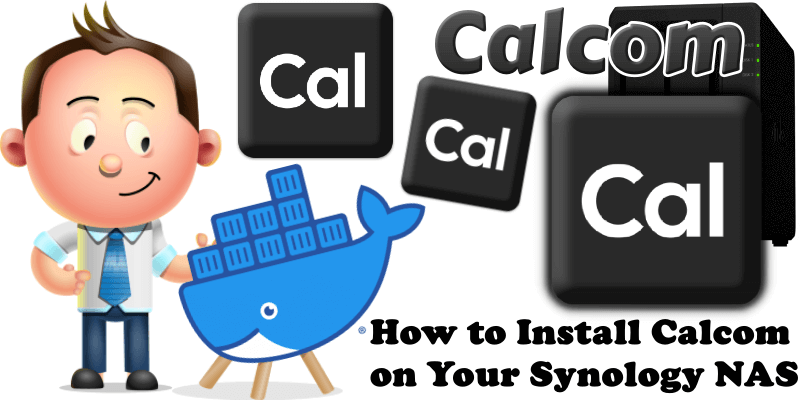
Calcom, formerly known as Calendso, is an open source Calendly alternative. With Calcom you are in charge of your own data, workflow and appearance. You have full control of your events and data, and have a power scheduling infrastructure. Calcom is an alternative to Alf.io. In this step by step guide I will show you how to Install Calcom on your Synology NAS using Docker and Portainer.
STEP 1
Please Support My work by Making a Donation.
STEP 2
Install Portainer using my step by step guide. If you already have Portainer installed on your Synology NAS, skip this STEP. Attention: Make sure you have installed the latest Portainer version.
STEP 3
Make sure you have a synology.me Wildcard Certificate. Follow my guide to get a Wildcard Certificate. If you already have a synology.me Wildcard certificate, skip this STEP.
STEP 4
Go to Control Panel / Login Portal / Advanced Tab / click Reverse Proxy. Follow the instructions in the image below.
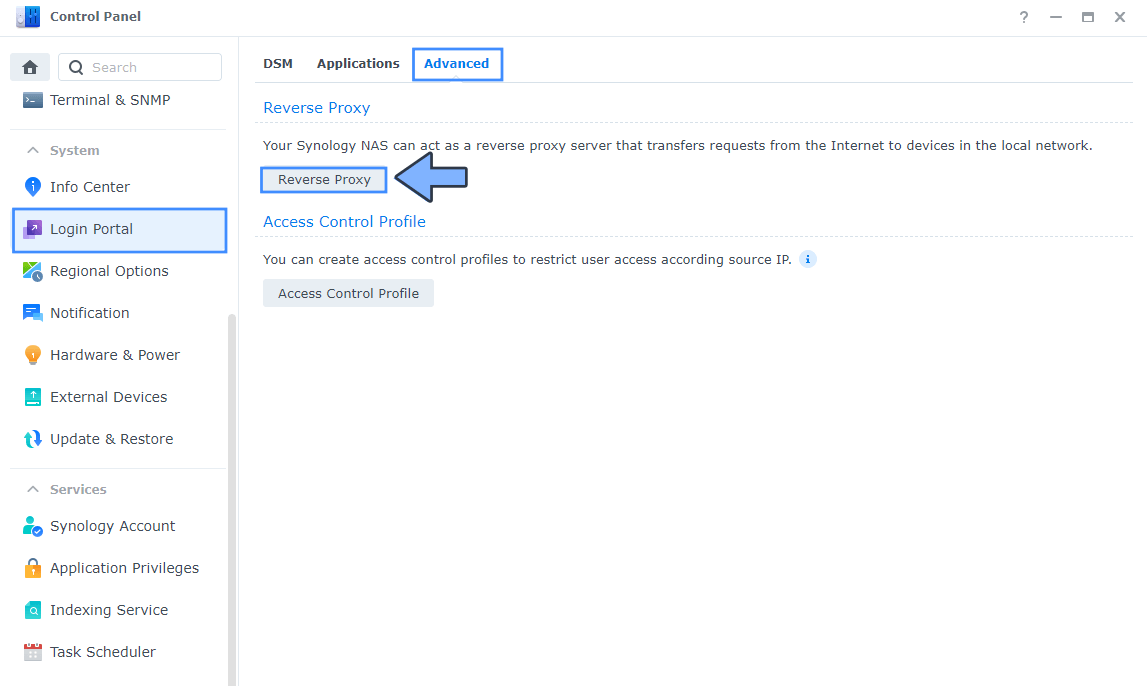
STEP 5
Now click the “Create” button. Follow the instructions in the image below.
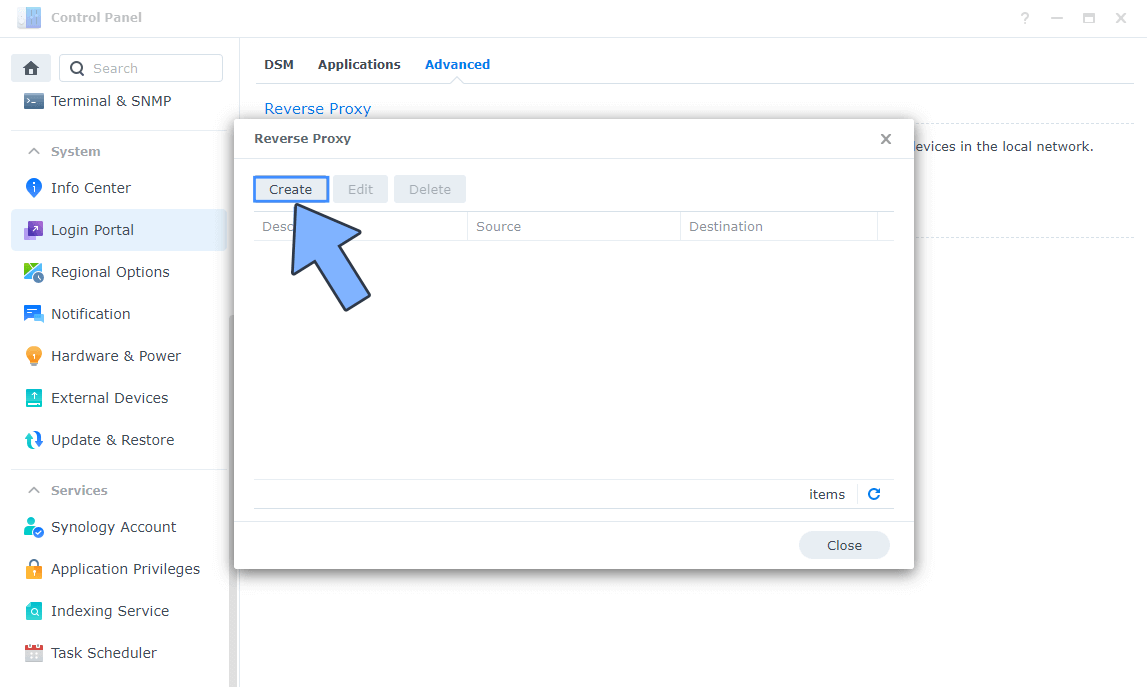
STEP 6
After you click the Create button, the window below will open. Follow the instructions in the image below.
On the General area, set the Reverse Proxy Name description: type in Calcom. After that, add the following instructions:
Source:
Protocol: HTTPS
Hostname: calcom.yourname.synology.me
Port: 443
Check Enable HSTS
Destination:
Protocol: HTTP
Hostname: localhost
Port: 9605
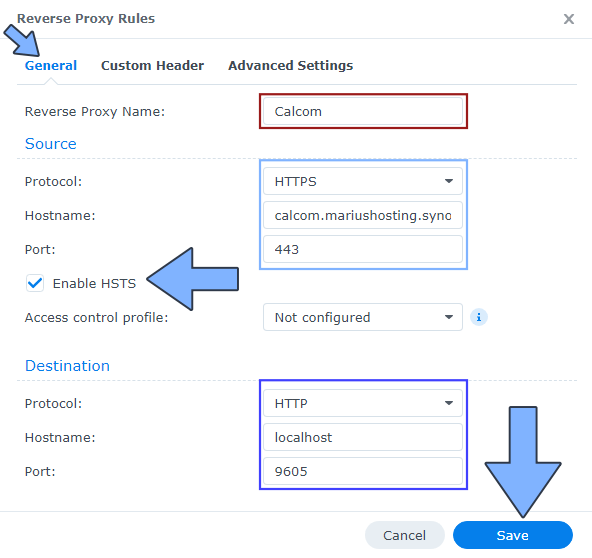
STEP 7
On the Reverse Proxy Rules, click the Custom Header tab. Click Create and then, from the drop-down menu, click WebSocket. After you click on WebSocket, two Header Names and two Values will be automatically added. Click Save. Follow the instructions in the image below.

STEP 8
Go to Control Panel / Login Portal / Advanced Tab / click Reverse Proxy. Follow the instructions in the image below.

SETP 9
Now click the “Create” button. Follow the instructions in the image below.
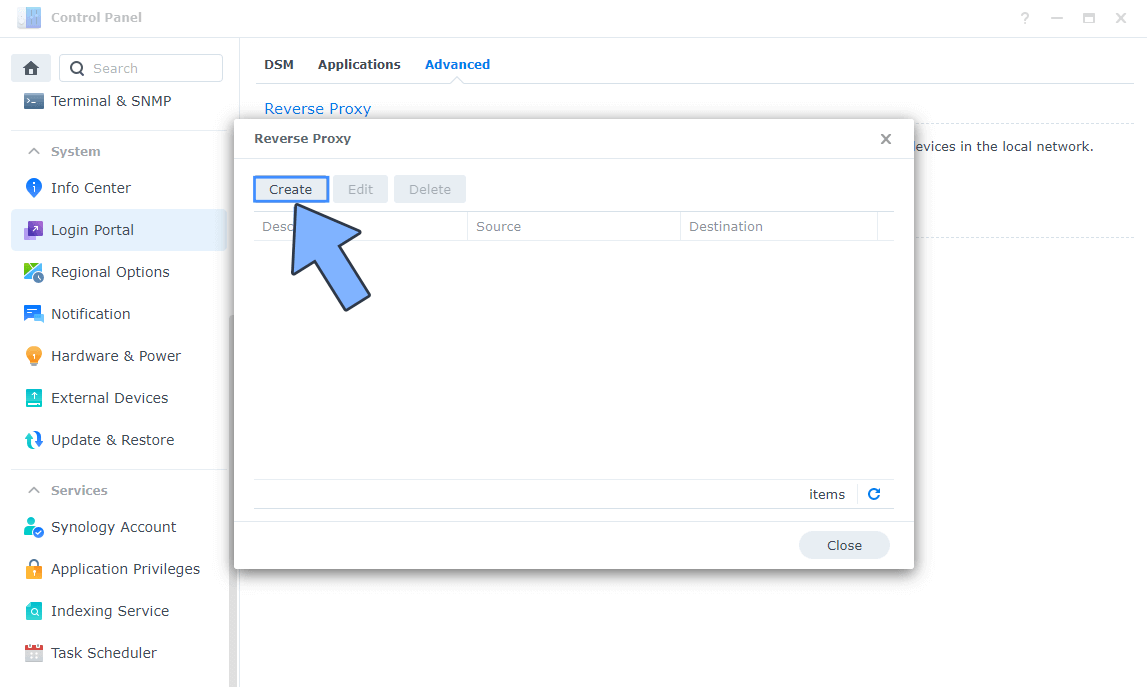
STEP 10
After you click the Create button, the window below will open. Follow the instructions in the image below.
On the General area, set the Reverse Proxy Name description: type in Calcom-API. After that, add the following instructions:
Source:
Protocol: HTTPS
Hostname: calcomapi.yourname.synology.me
Port: 443
Check Enable HSTS
Destination:
Protocol: HTTP
Hostname: localhost
Port: 5556
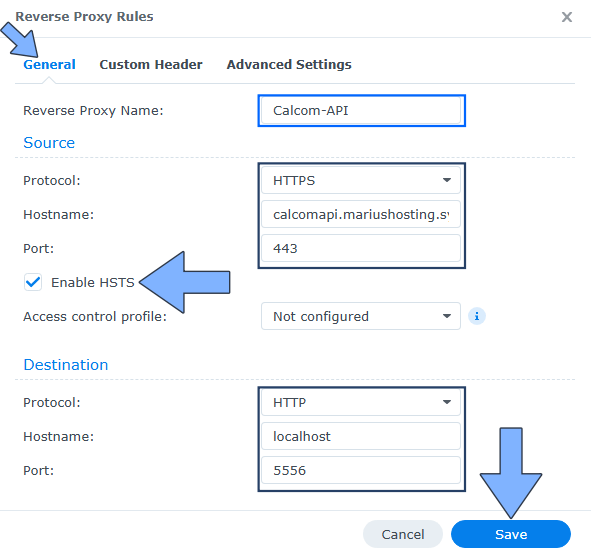
STEP 11
On the Reverse Proxy Rules, click the Custom Header tab. Click Create and then, from the drop-down menu, click WebSocket. After you click on WebSocket, two Header Names and two Values will be automatically added. Click Save. Follow the instructions in the image below.

STEP 12
Go to Control Panel / Network / Connectivity tab/ Check Enable HTTP/2 then click Apply. Follow the instructions in the image below.
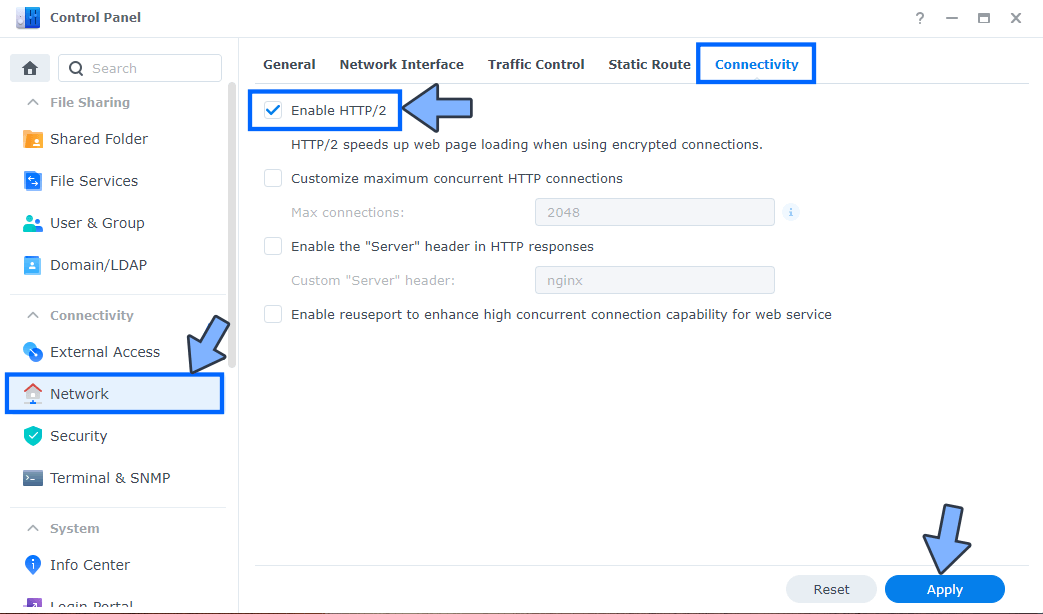
STEP 13
Go to Control Panel / Security / Advanced tab/ Check Enable HTTP Compression then click Apply. Follow the instructions in the image below.
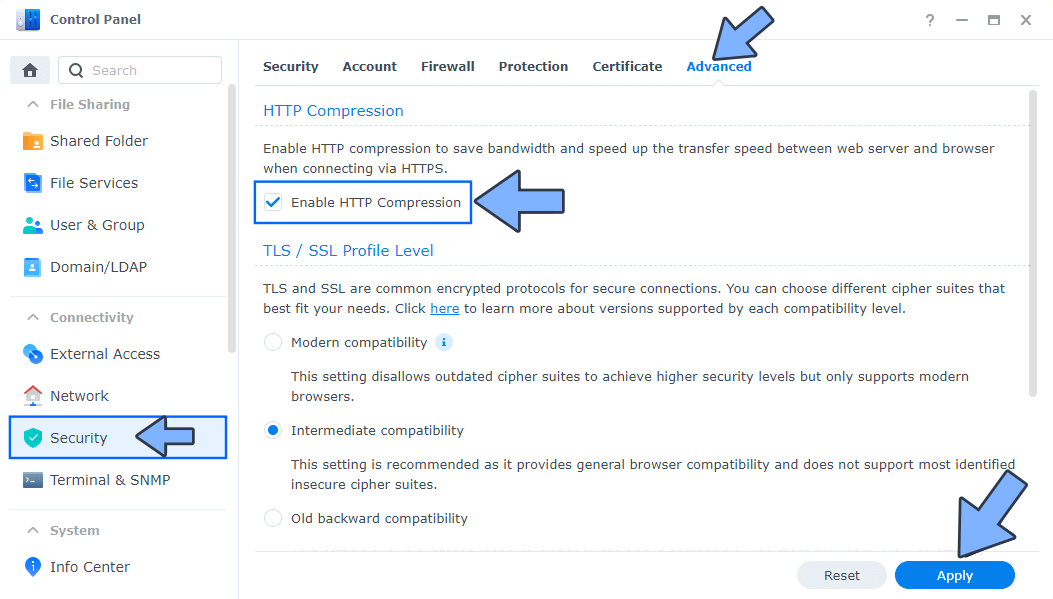
STEP 14
Go to File Station and open the docker folder. Inside the docker folder, create one new folder and name it calcomdb. Follow the instructions in the image below.
Note: Be careful to enter only lowercase, not uppercase letters.
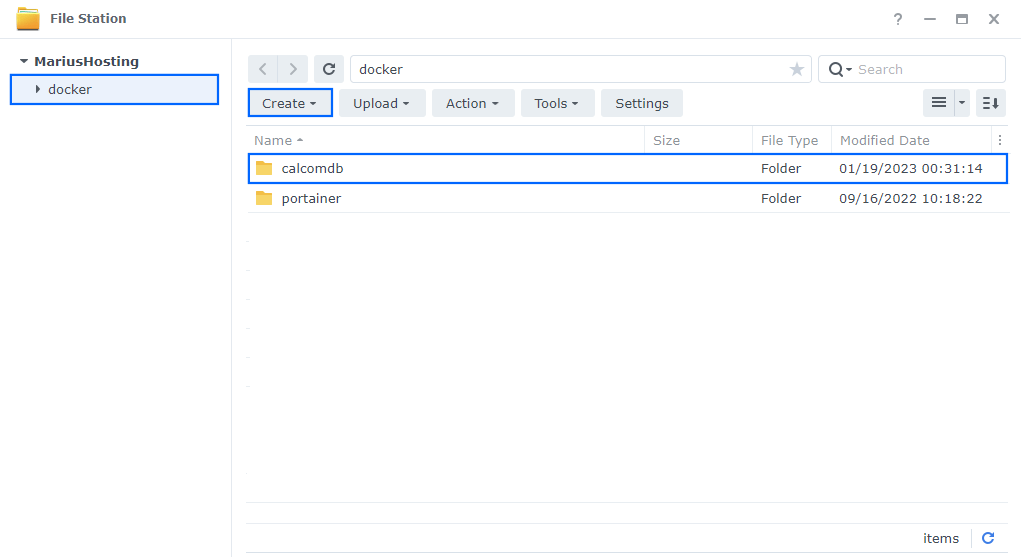
STEP 15
Follow my step by step guide on how to activate SMTP for your Gmail account. This step is mandatory. Note: If you don’t want to use the easiest way for SMTP with Google and you already have SMTP details from your own Mail Server, you can just skip this STEP and use your personalized email SMTP details instead.
STEP 16
Log into Portainer using your username and password. On the left sidebar in Portainer, click on Home then Live connect. Follow the instructions in the image below.

On the left sidebar in Portainer, click on Stacks then + Add stack. Follow the instructions in the image below.

STEP 17
In the Name field type in calcom. Follow the instructions in the image below.
services:
db:
image: postgres:17
container_name: Calcom-DB
hostname: calcom-db
security_opt:
- no-new-privileges:true
healthcheck:
test: ["CMD", "pg_isready", "-q", "-d", "calcom", "-U", "calcomuser"]
interval: 10s
timeout: 5s
retries: 5
volumes:
- /volume1/docker/calcomdb:/var/lib/postgresql/data:rw
env_file:
- stack.env
restart: on-failure:5
calcom:
image: calcom/cal.com:latest
container_name: Calcom
hostname: calcom
security_opt:
- no-new-privileges:true
healthcheck:
test: wget --no-verbose --tries=1 --spider http://localhost:3000/ || exit 1
ports:
- 9605:3000
- 5556:5555
env_file:
- stack.env
environment:
NEXT_PUBLIC_API_V2_URL: https://calcomapi.yourname.synology.me
restart: on-failure:5
depends_on:
db:
condition: service_started
Note: Before you paste the code above in the Web editor area below, change the value for NEXT_PUBLIC_API_V2_URL and type in your own synology.me DDNS with https:// at the beginning that you have previously created at STEP 10.
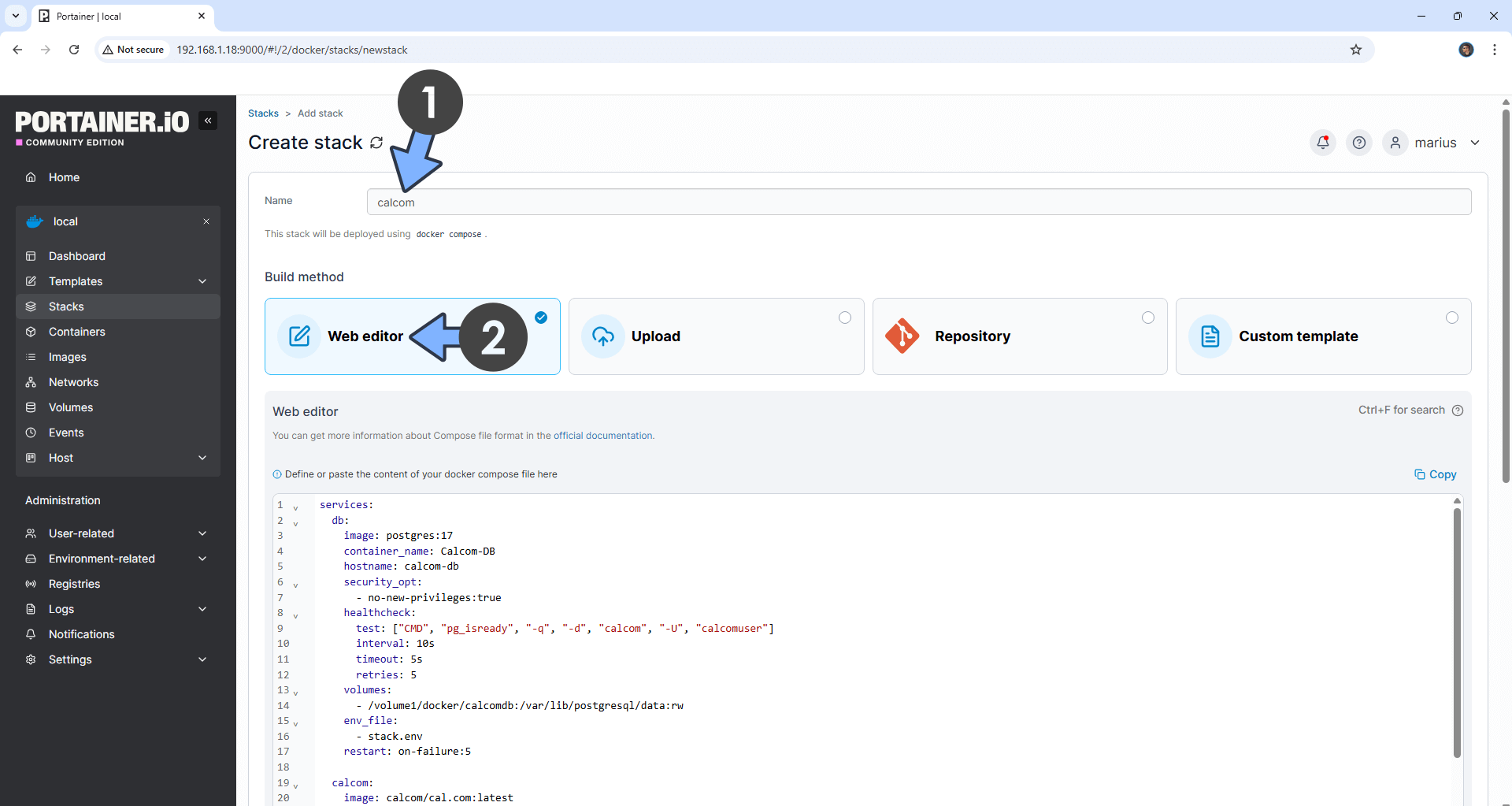
STEP 18
Click the Upload button after Web editor. Download the stack.env file by clicking the blue link below and then upload it from your computer in the “Load variables from .env files“. Follow the instructions in the image below. 🔒Note: Support my work to unlock the password. You can use this password to download any file on mariushosting forever!
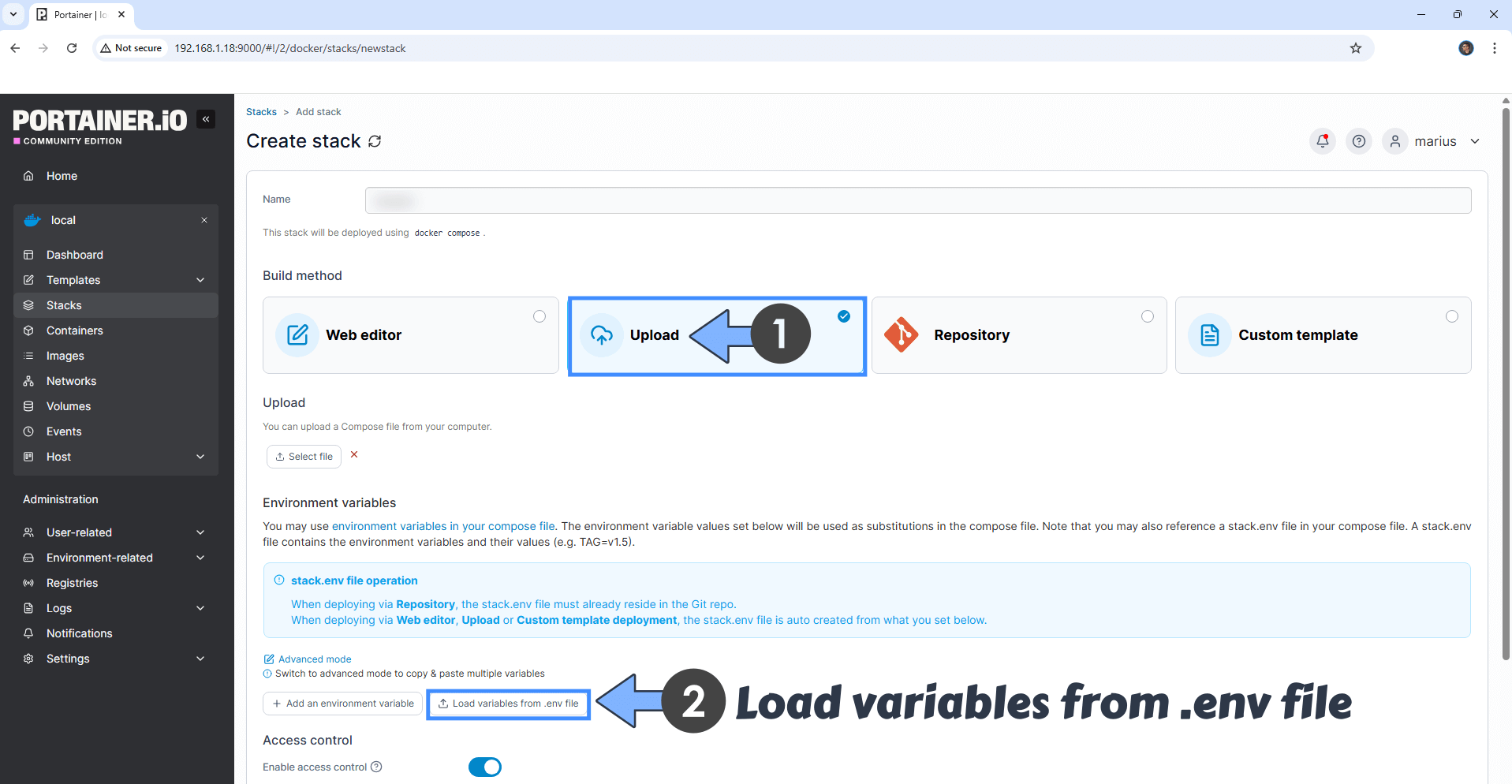
STEP 19
Note: On the Environment variables change the value for EMAIL_FROM. Type in your own Gmail address that you have previously created at STEP 15.
Note: On the Environment variables change the value for EMAIL_SERVER_USER. Type in your own Gmail address that you have previously created at STEP 15.
Note: On the Environment variables change the value for EMAIL_SERVER_PASSWORD. Type in your own Gmail App password that you have previously created at STEP 15.
Note: On the Environment variables change the value for TZ and add your own TIMEZONE. (Select your current Time Zone from this list.)
Note: On the Environment variables change the value for NEXT_PUBLIC_WEBAPP_URL. Type in your own synology.me DDNS that you have previously created at STEP 6 with https at the beginning.
Note: Before you paste the code above in the Web editor area below, change the value for NEXTAUTH_SECRET. (Generate your free Random 24 byte base 64 NEXTAUTH_SECRET.) ⚠️Warning: Check the example in the following screenshot: EXAMPLE. When you go to the link to generate your NEXTAUTH_SECRET, make sure you change the default 16 byte code to 24, as per the example in the EXAMPLE screenshot.
Note: Before you paste the code above in the Web editor area below, change the value for CALENDSO_ENCRYPTION_KEY. (Generate your free Random 24 byte base 64 CALENDSO_ENCRYPTION_KEY.) ⚠️Warning: Check the example in the following screenshot: EXAMPLE. When you go to the link to generate your CALENDSO_ENCRYPTION_KEY, make sure you change the default 16 byte code to 24, as per the example in the EXAMPLE screenshot.
Warning: Do not change any of the other values.
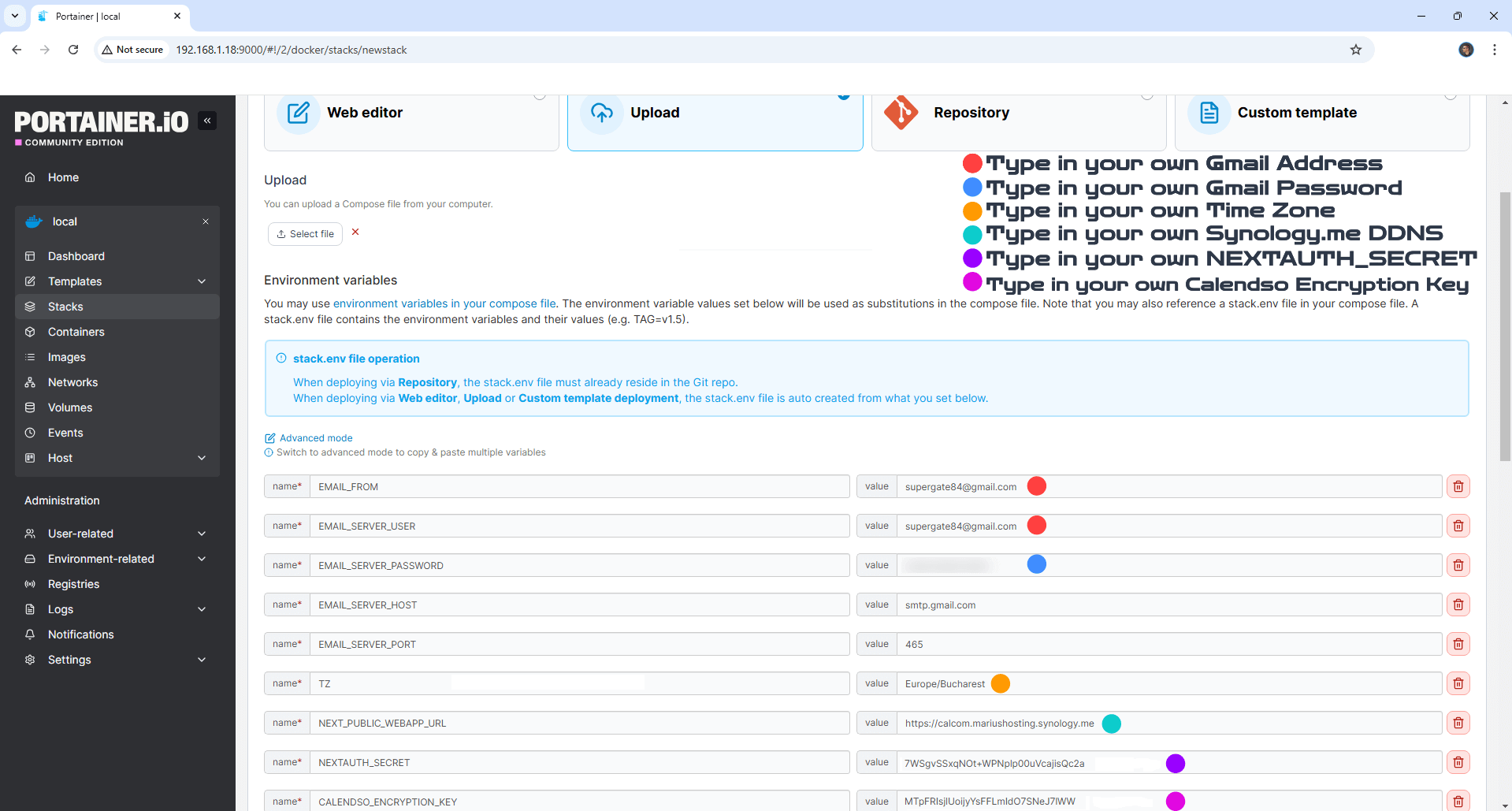
STEP 20
After you make the changes, click the Web editor button. Follow the instructions in the image below.
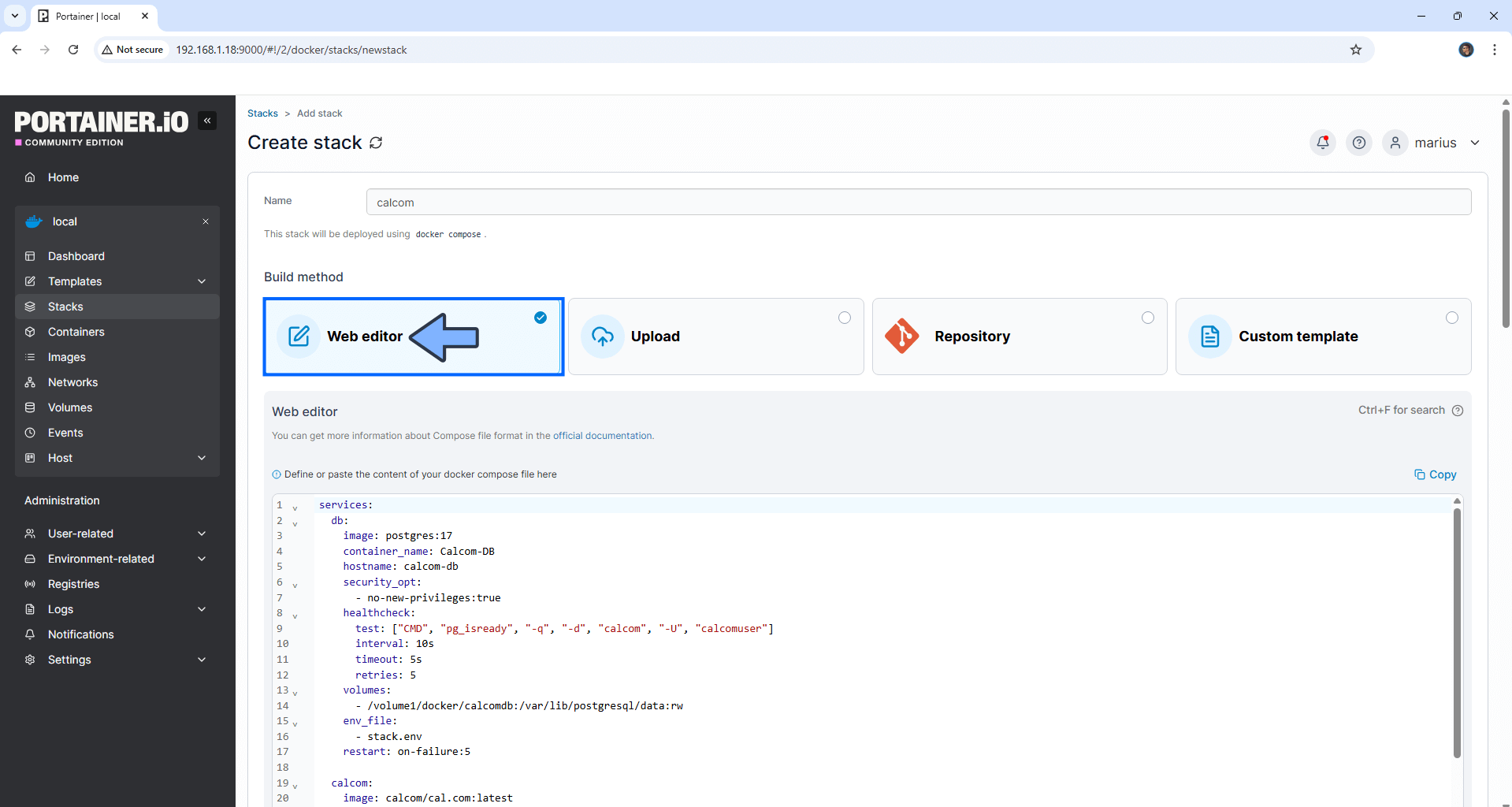
STEP 21
Scroll down on the page until you see a button named Deploy the stack. Click on it. Follow the instructions in the image below. The installation process can take up to a few minutes. It will depend on your Internet speed connection.
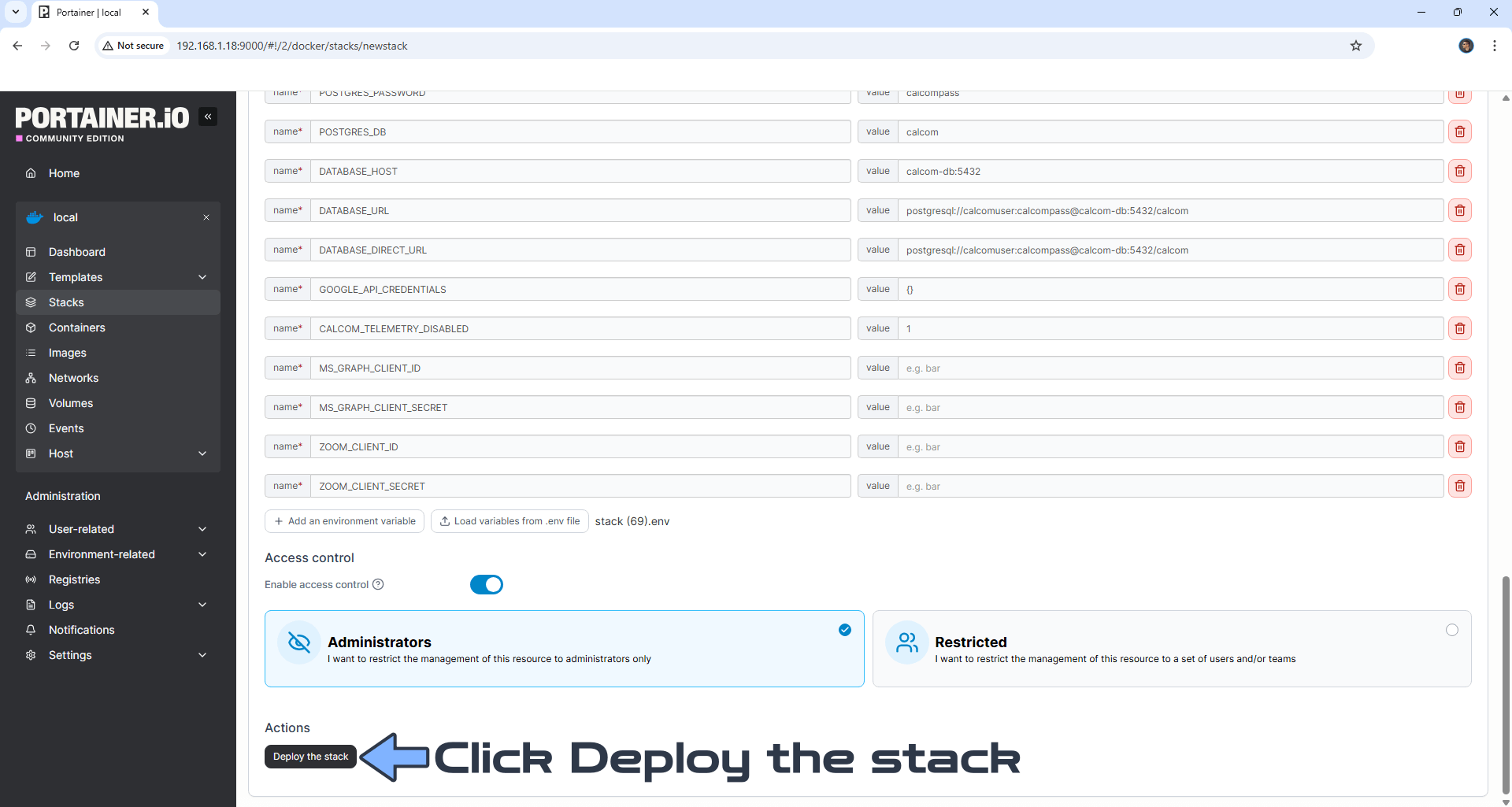
STEP 22
If everything goes right, you will see the following message at the top right of your screen: “Success Stack successfully deployed“.

STEP 23
🟢Please Support My work by Making a Donation. Almost 99,9% of the people that install something using my guides forget to support my work, or just ignore STEP 1. I’ve been very honest about this aspect of my work since the beginning: I don’t run any ADS, I don’t require subscriptions, paid or otherwise, I don’t collect IPs, emails, and I don’t have any referral links from Amazon or other merchants. I also don’t have any POP-UPs or COOKIES. I have repeatedly been told over the years how much I have contributed to the community. It’s something I love doing and have been honest about my passion since the beginning. But I also Need The Community to Support me Back to be able to continue doing this work.
STEP 24
The installation process can take up to a few seconds/minutes. Please wait approximately 5-10 minutes or you will get a blank synology error page if you try to connect too soon. Now open your browser and type in your HTTPS/SSL certificate like this https://calcom.yourname.synology.me In my case it’s https://calcom.mariushosting.synology.me If everything goes right, you will see the Calcom Login page. Type in your own Username, Full name, Email address and Password, then click Next. Follow the instructions in the image below.
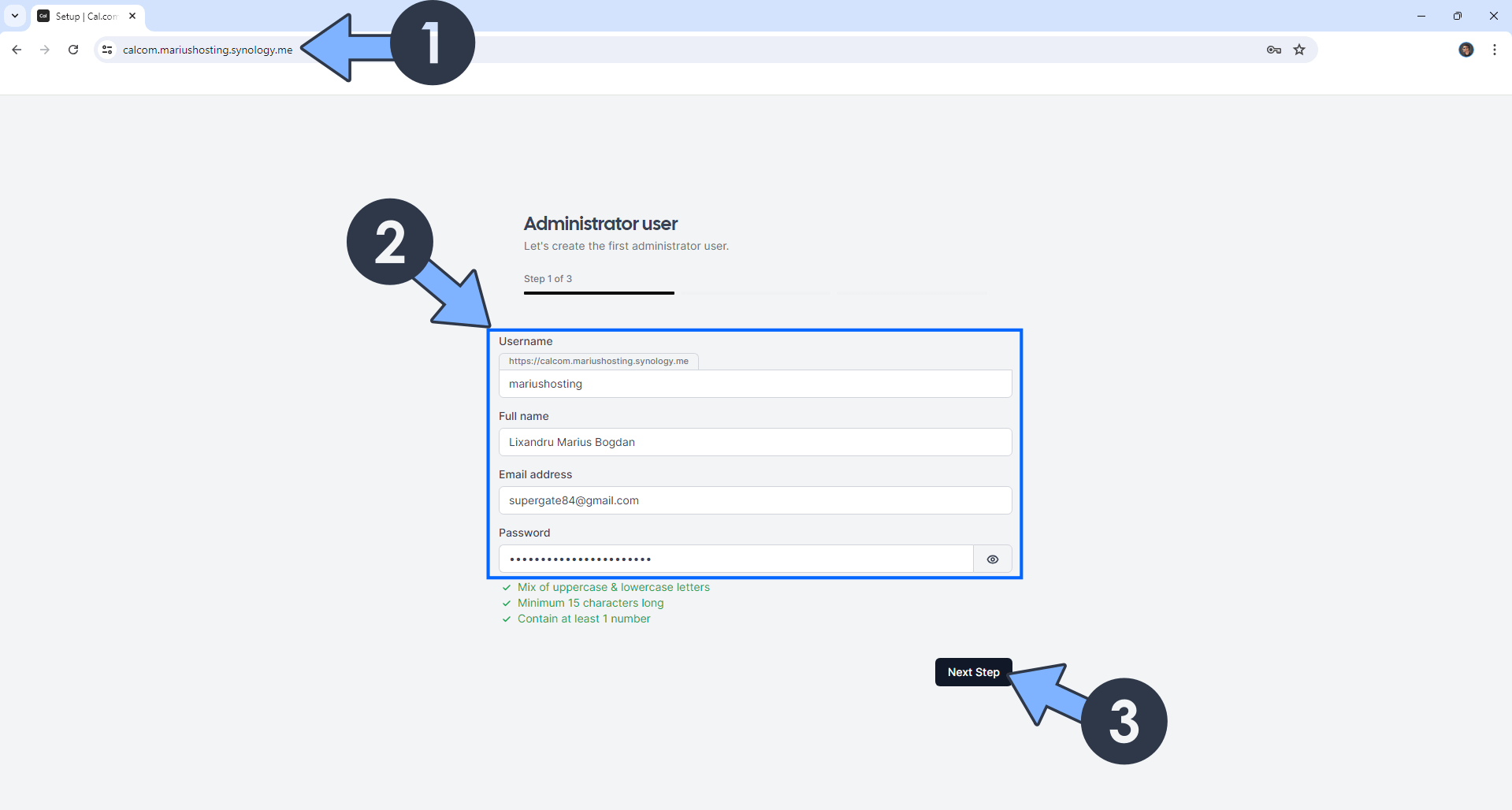
STEP 25
Select AGPLv3 License. Click Skip Step. Follow the instructions in the image below.
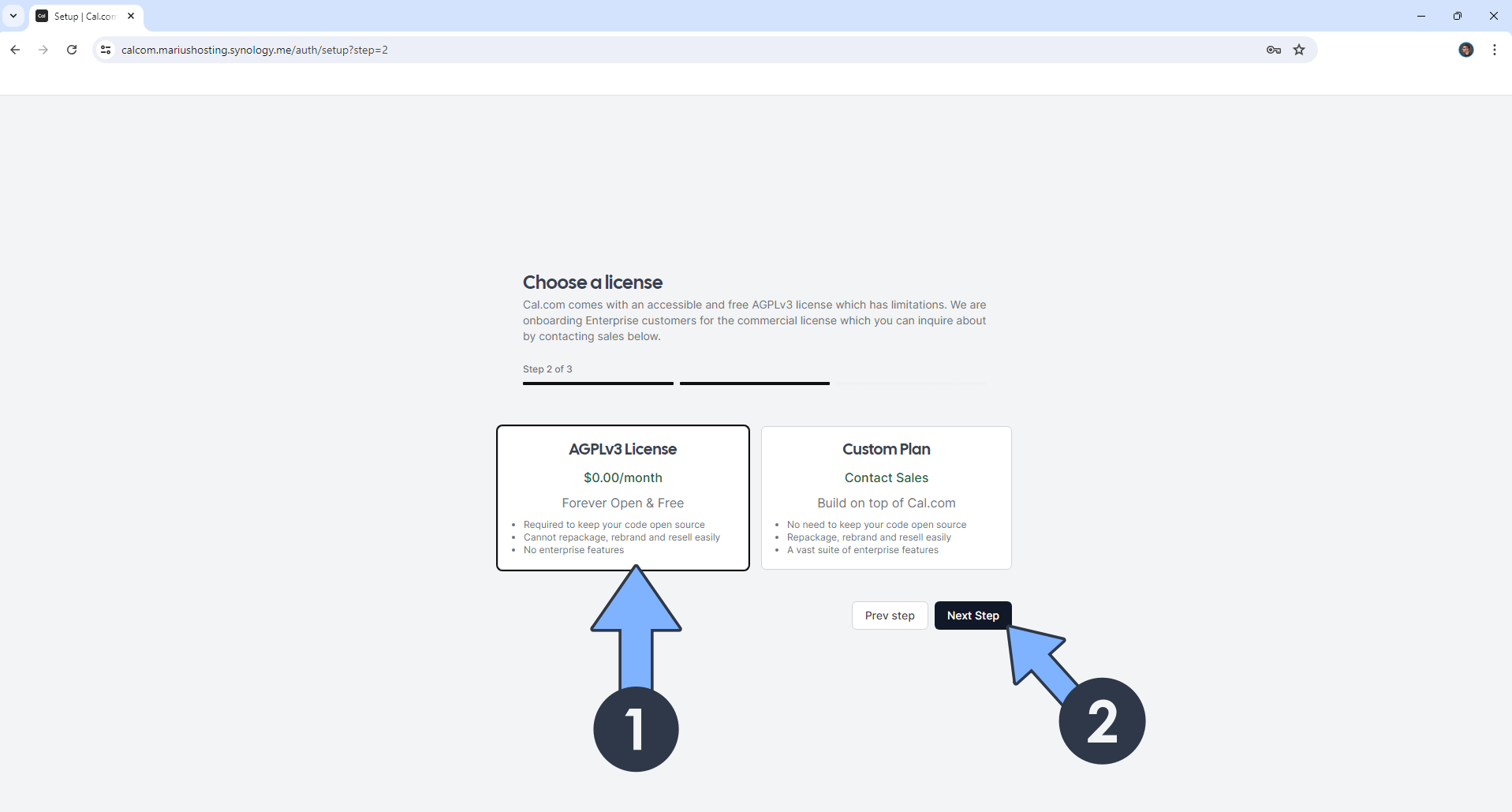
STEP 26
For now, click Finish. All the options you see, you will set them up later on with calm. Follow the instructions in the image below.
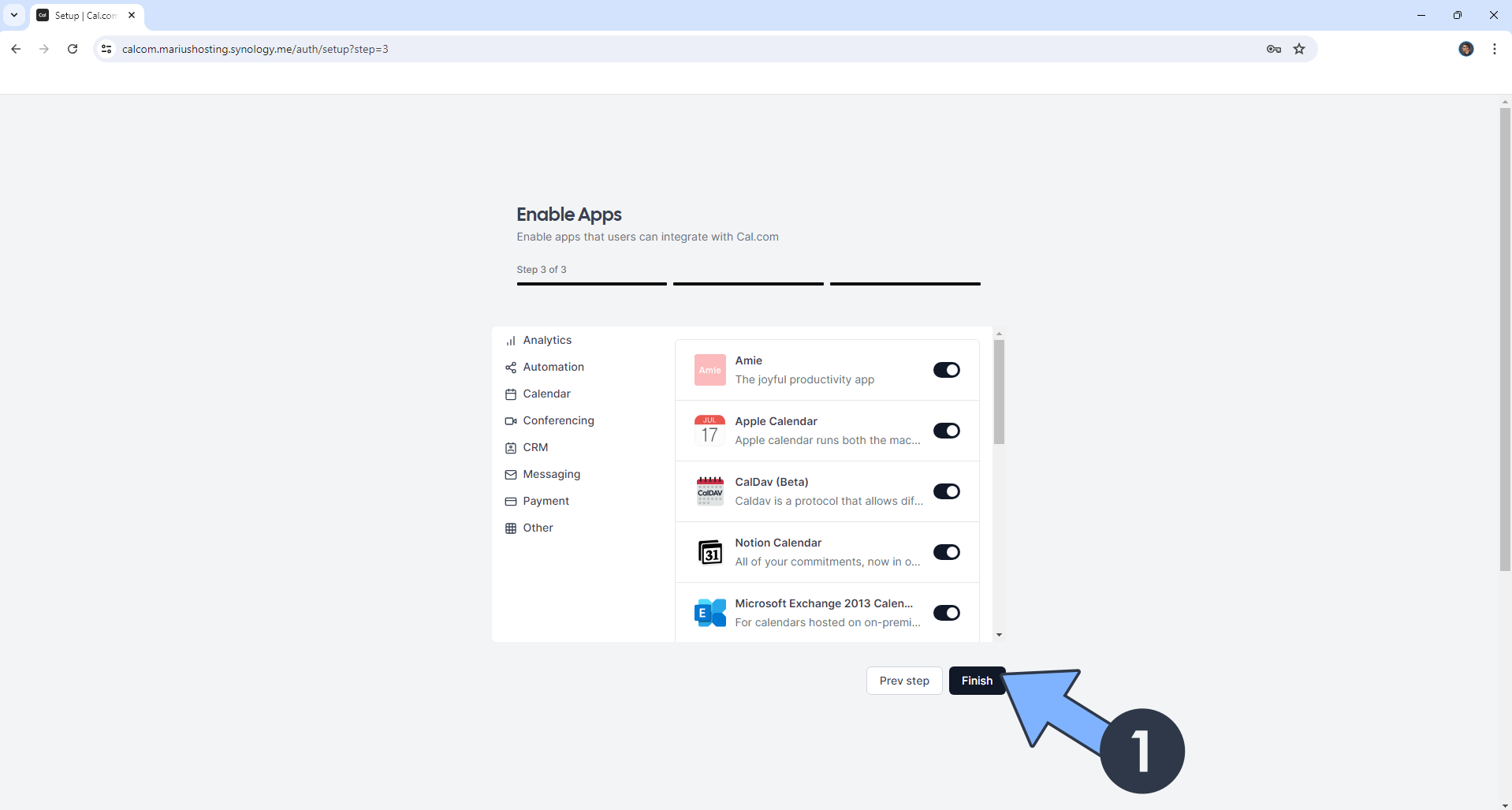
STEP 27
Type in your own Username and your Full name that you have previously create at STEP 24. Select your Timezone then click Next Step. Follow the instructions in the image below.
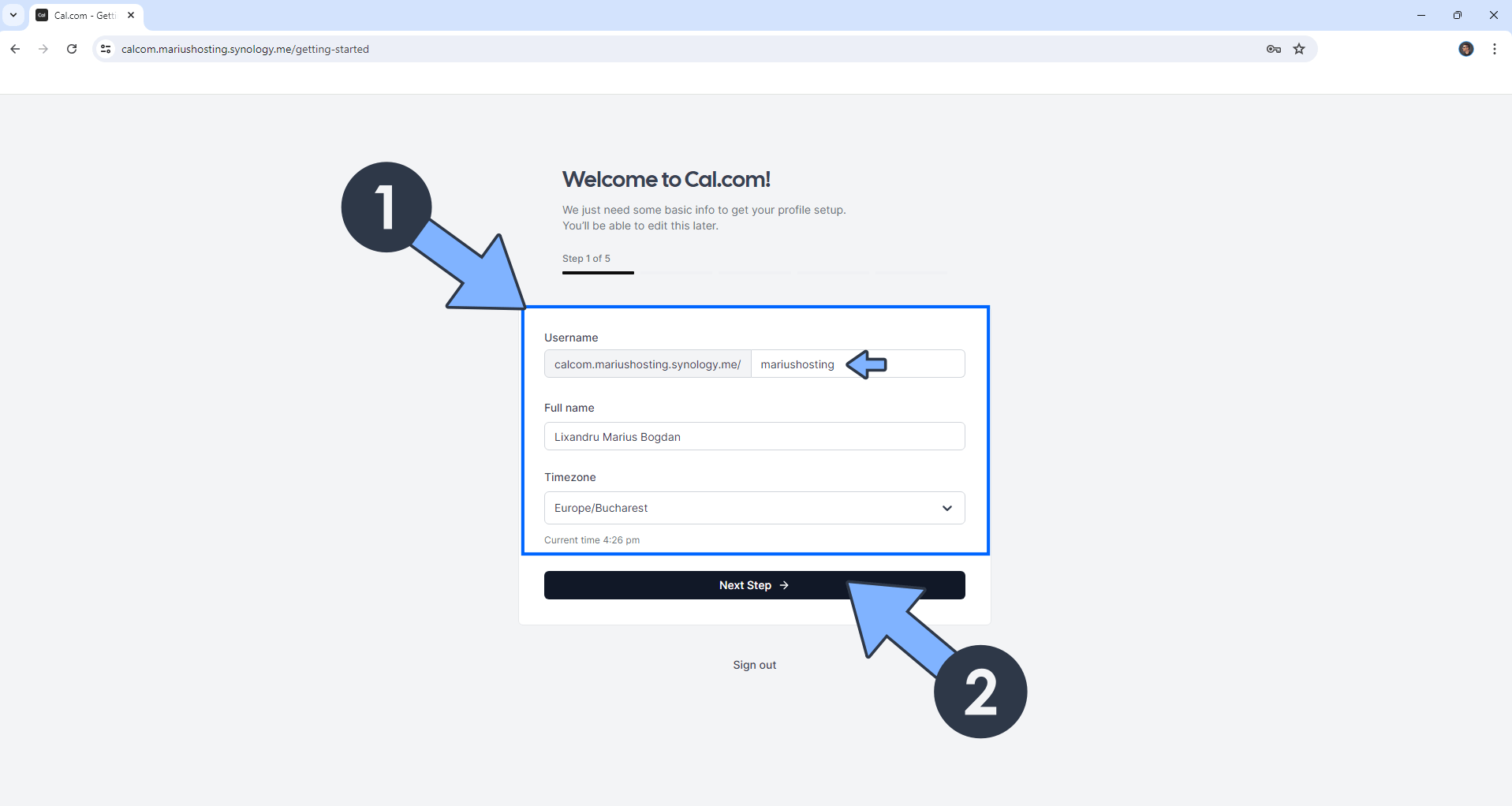
STEP 28
Click I’ll connect my calendar later to set up your calendar later on with calm. Follow the instructions in the image below.
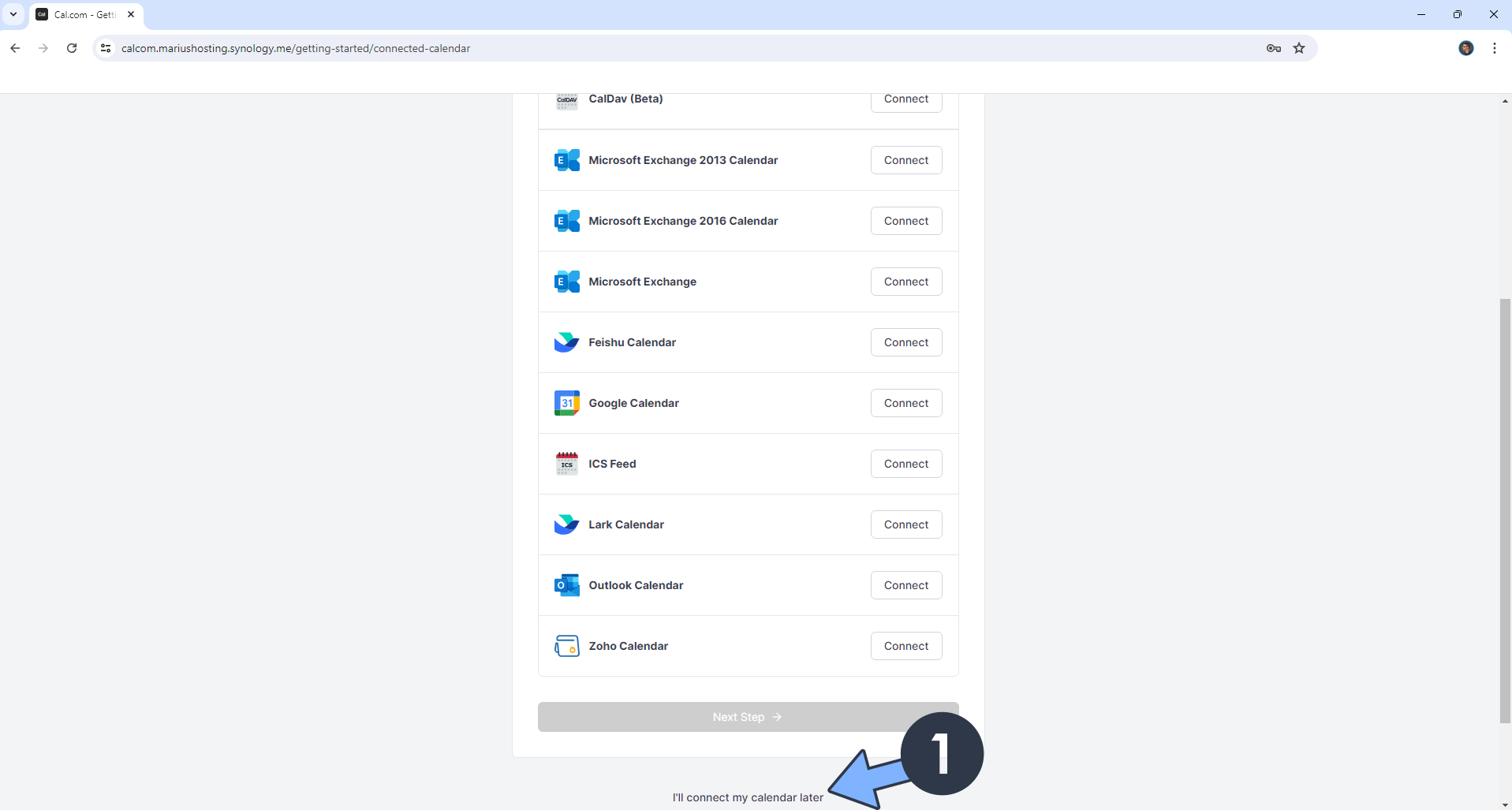
STEP 29
Click Set up later to set up your video apps later on with calm. Follow the instructions in the image below.
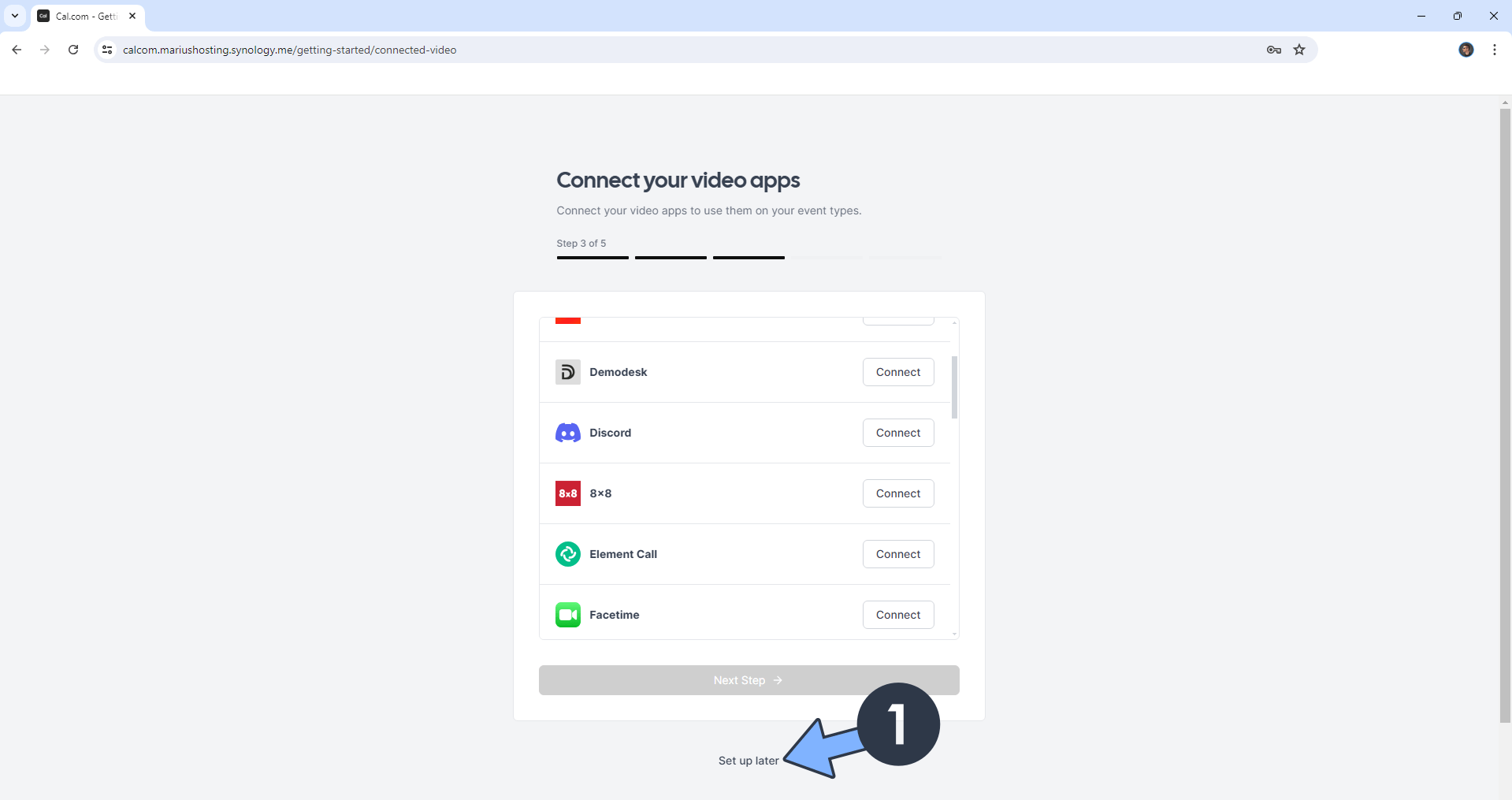
STEP 30
Click Complete your Profile. You can set your availability later on with calm. Follow the instructions in the image below.
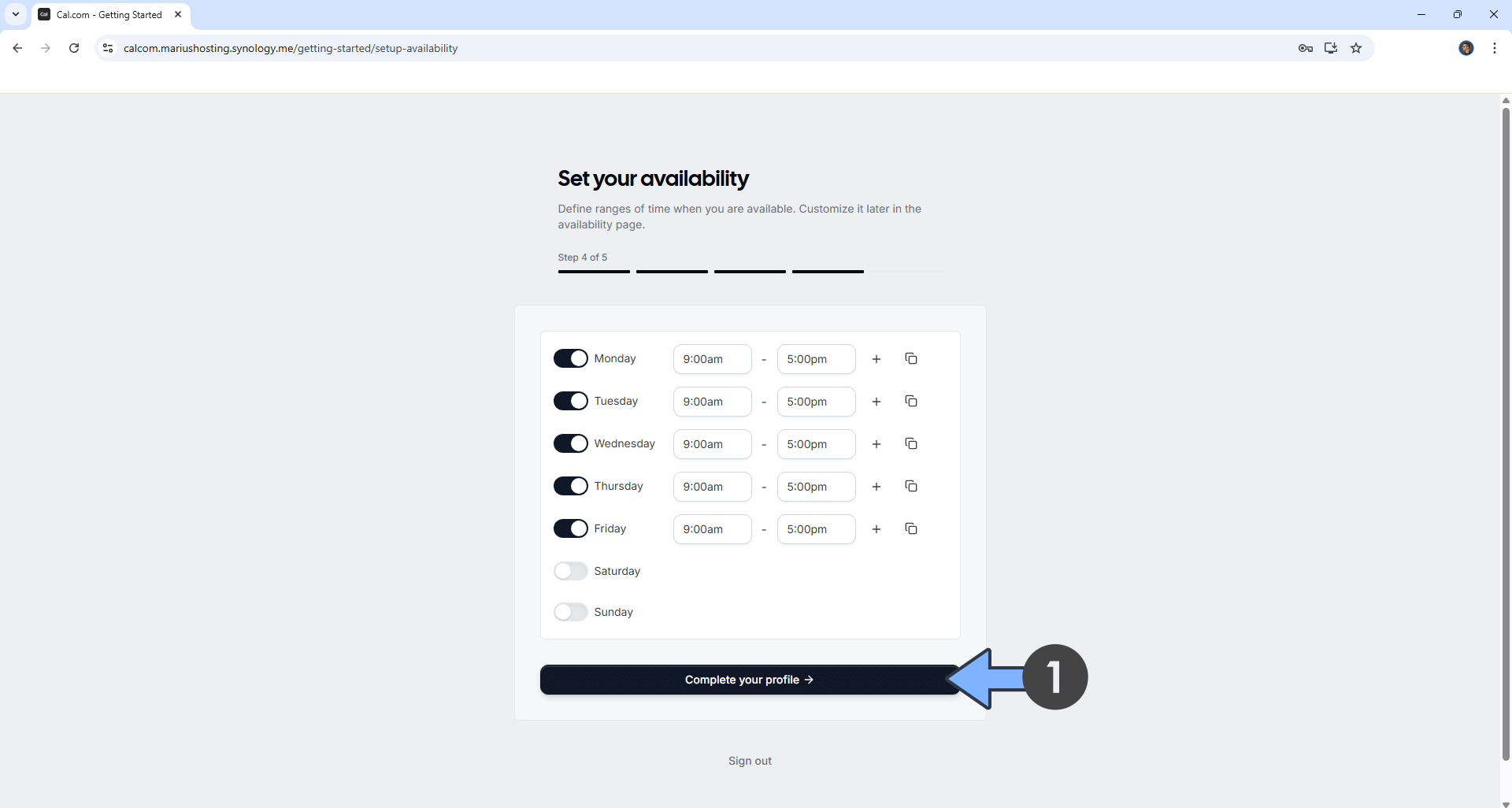
STEP 31
Upload your own profile photo, type in a few sentences about yourself, then click Finish Setup and Get Started. Follow the instructions in the image below.
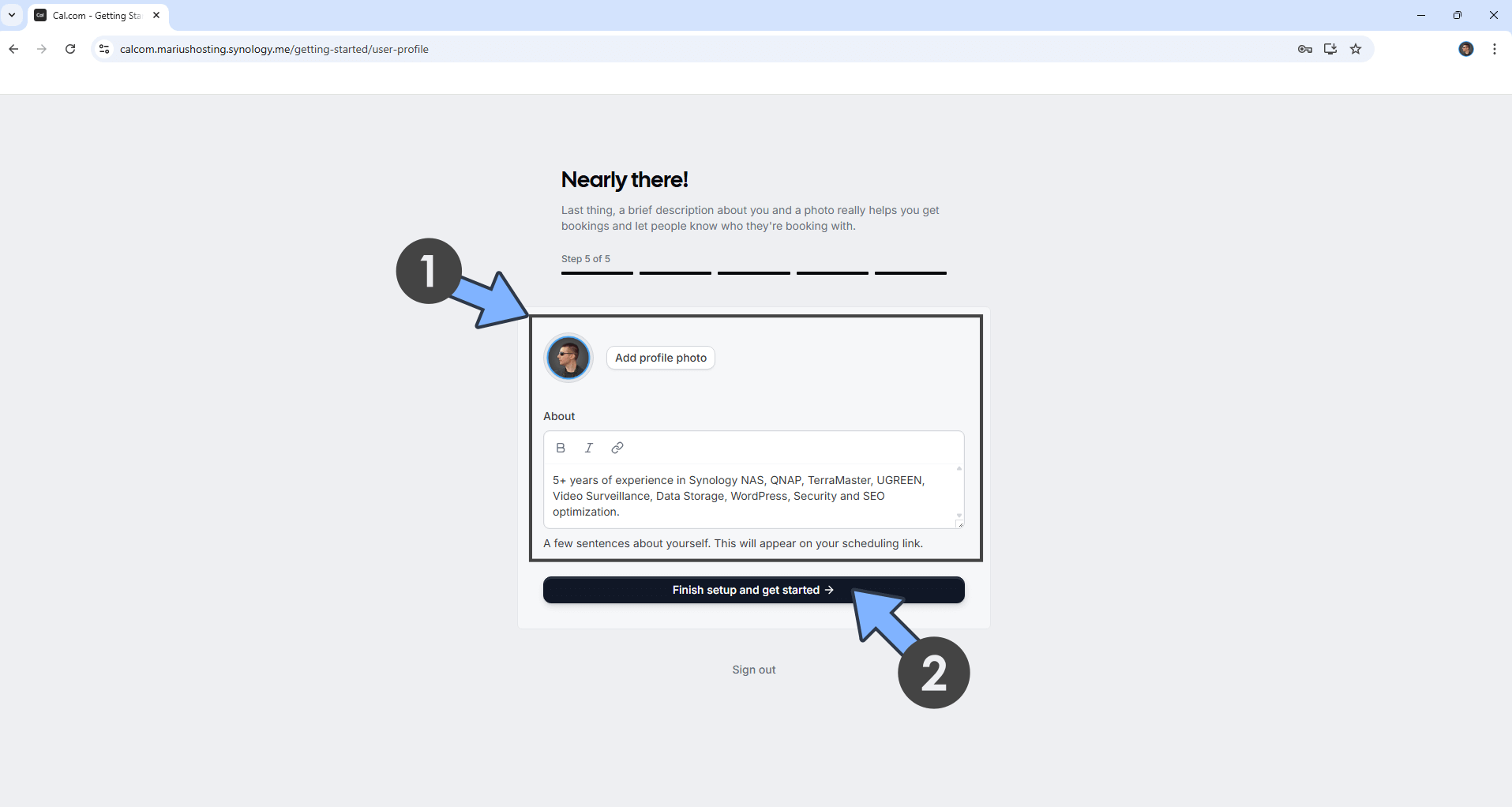
STEP 32
Click Change Your Password to gain admin access. Follow the instructions in the image below.
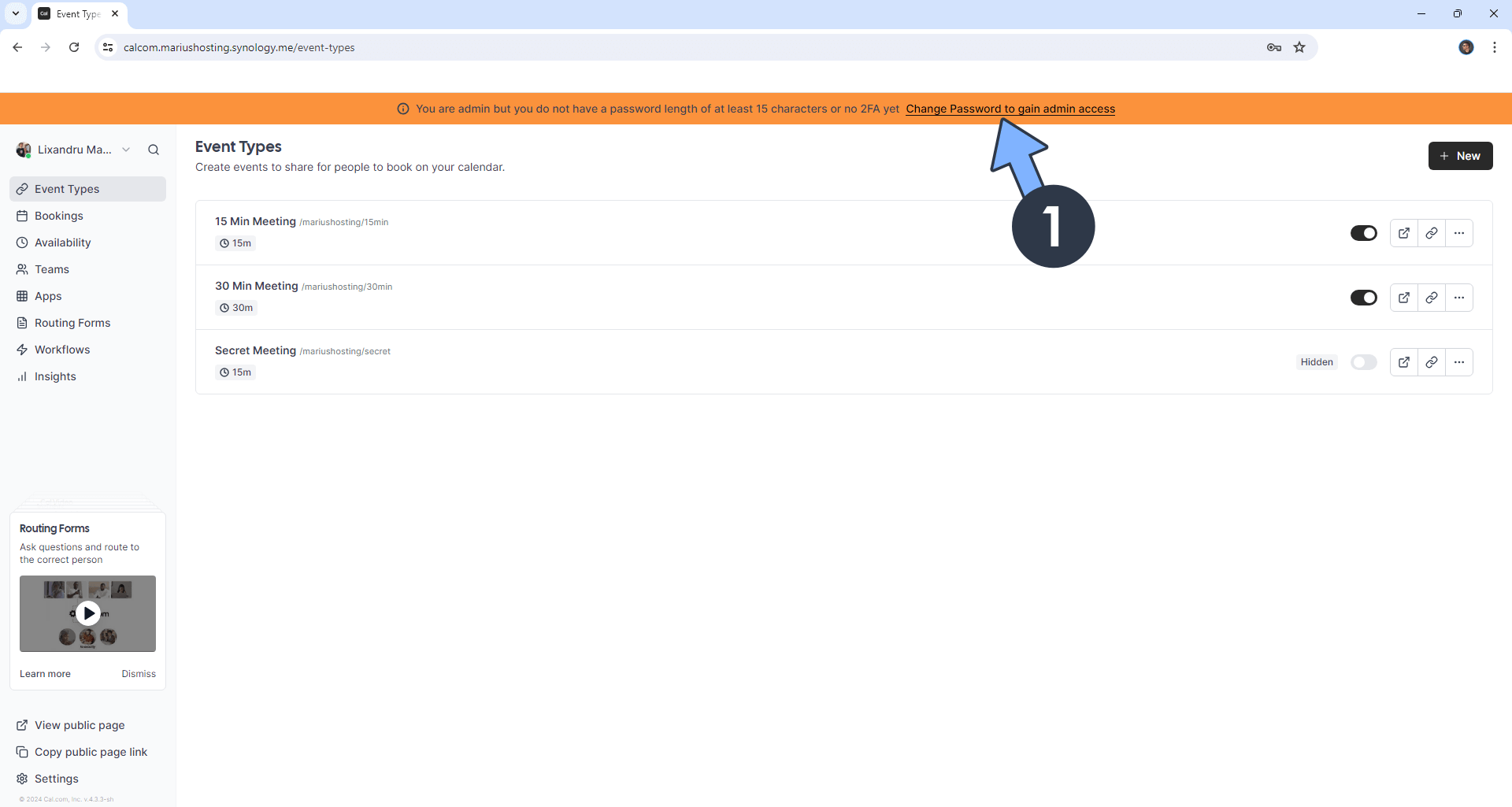
STEP 33
On the left sidebar, click Two factor auth. Enable Two factor authentication. Download the Google Authenticator app for Android or iOS on your mobile phone. Type in your own Calcom password that you have previously set up at STEP 24, then click Continue. Follow the instructions in the image below.
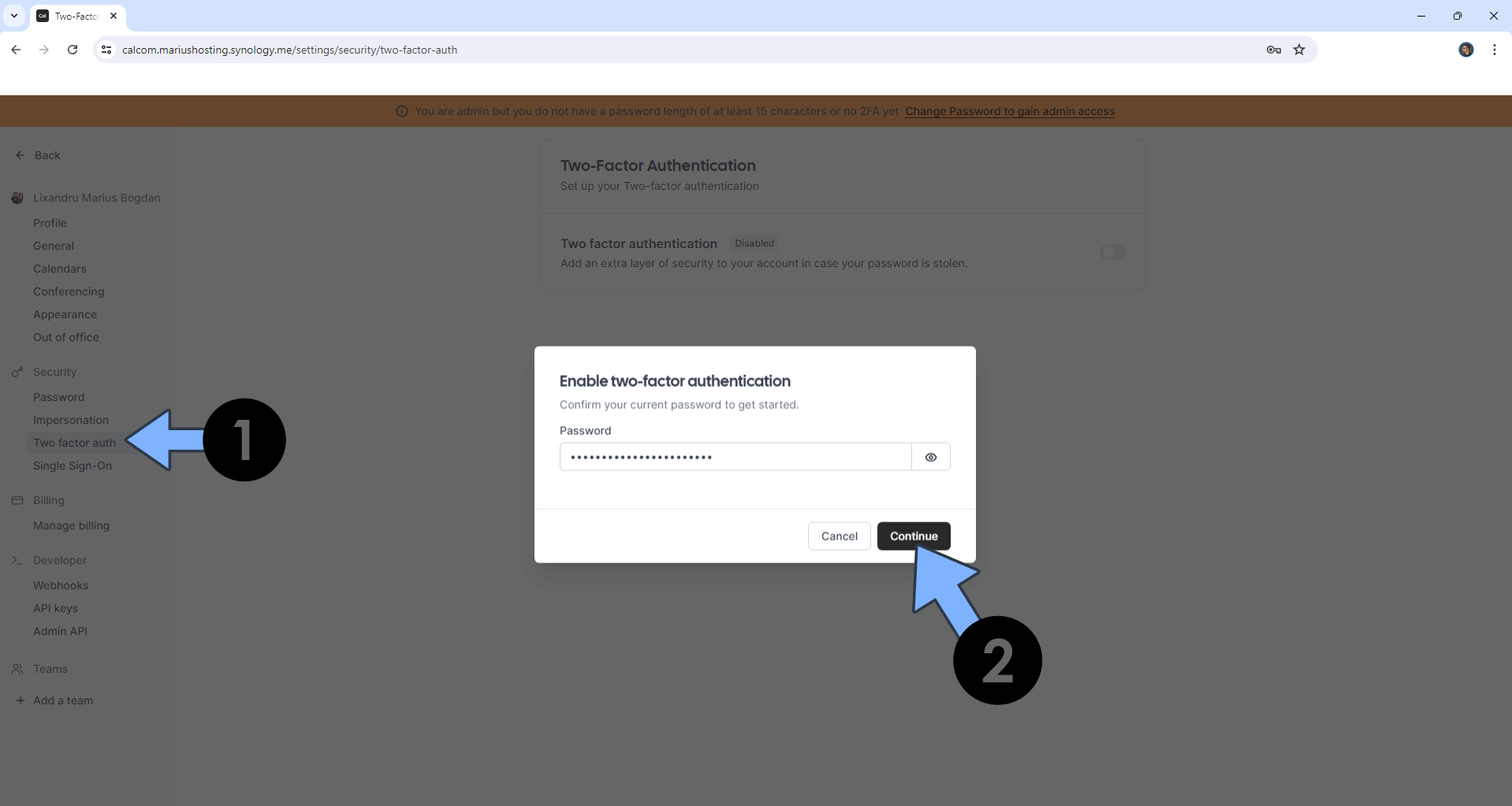
STEP 34
Scan the QR code with your authenticator app, then click Continue. Follow the instructions in the image below.
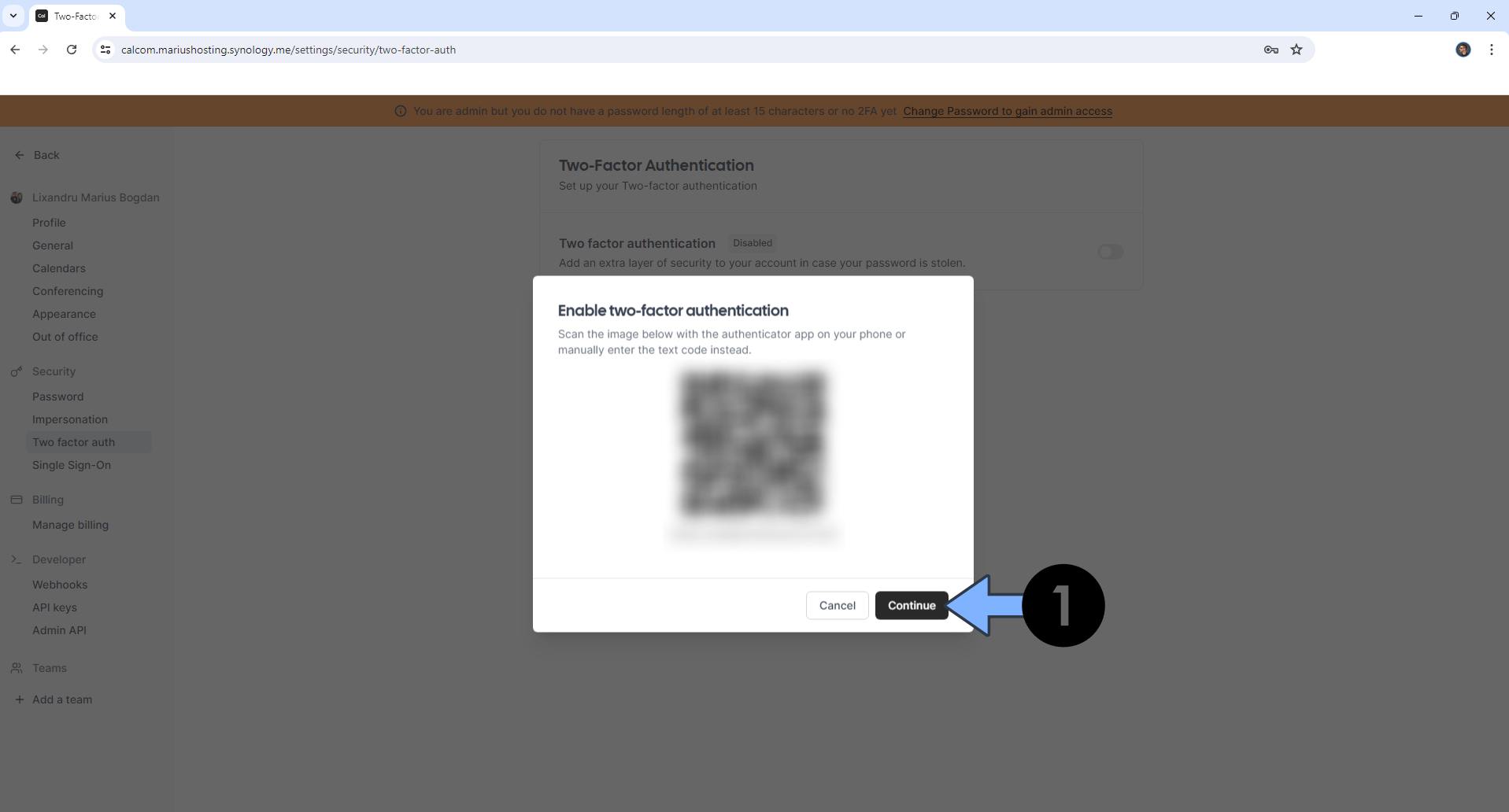
STEP 35
Type in your Two-Factor Code, then click Enable. Follow the instructions in the image below.
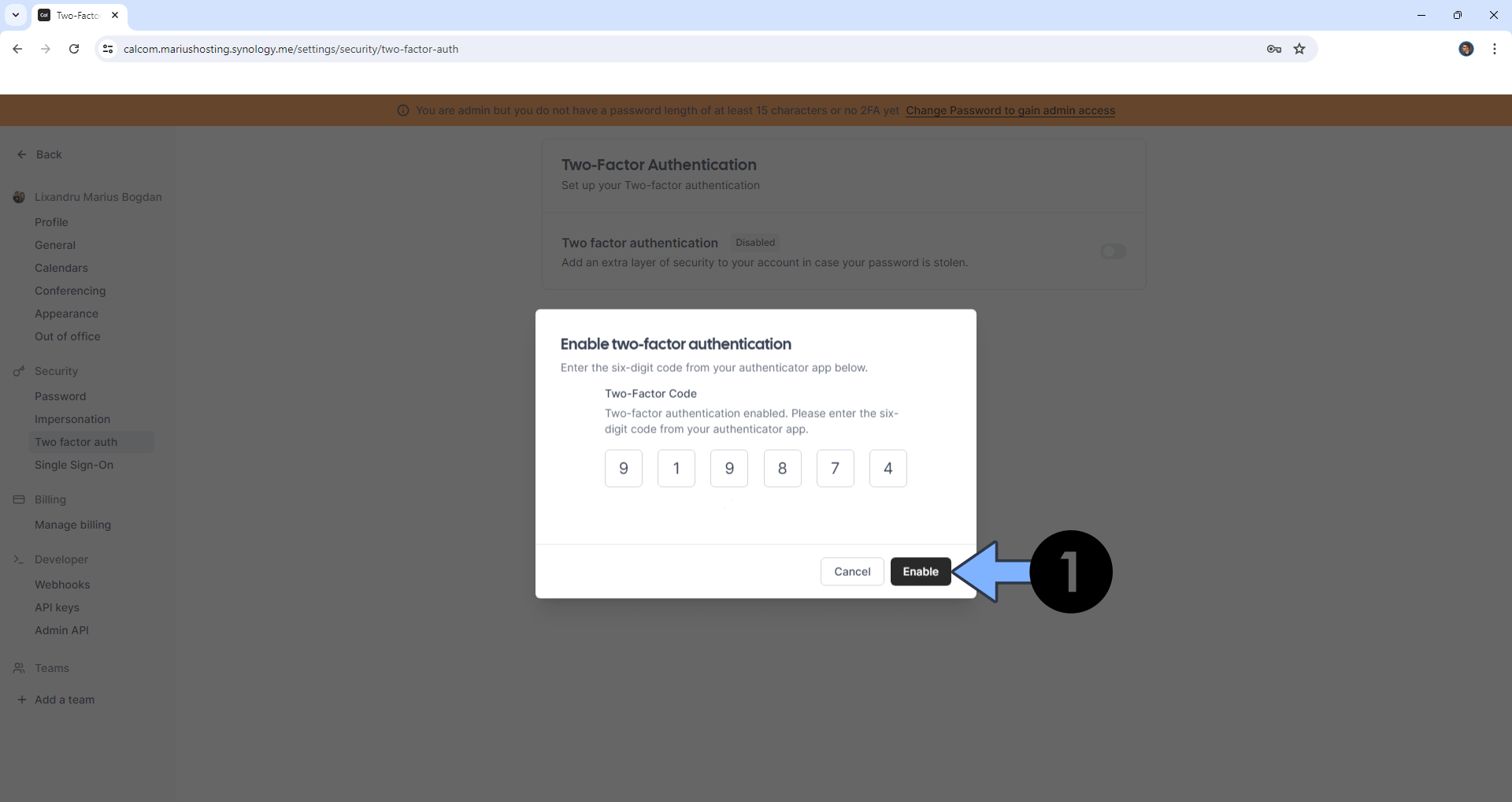
STEP 36
Download your Backup Codes then click Download. Follow the instructions in the image below.
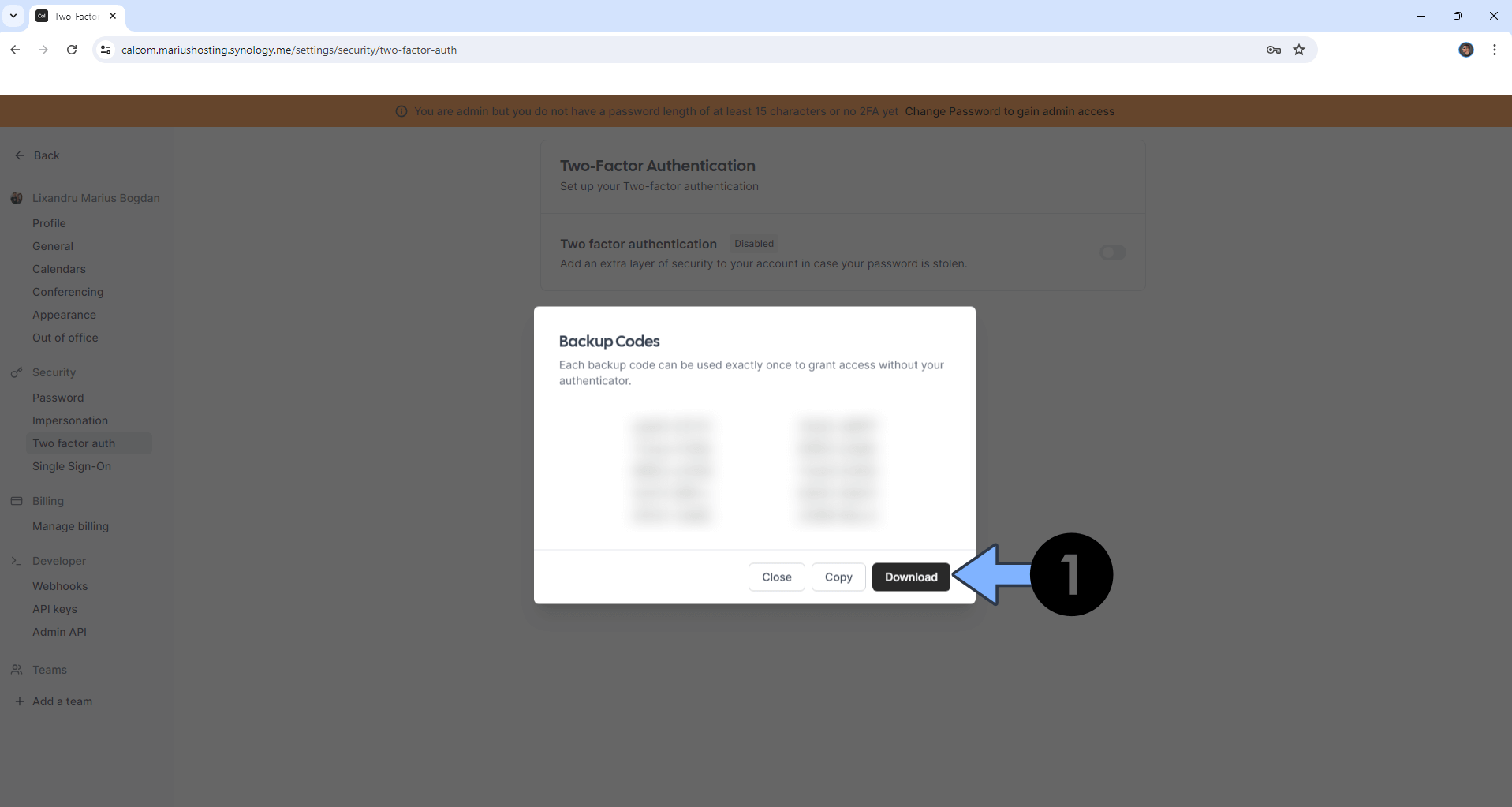
STEP 37
After you correctly set up two factor auth, on the left sidebar click on Password, then change your current password with another password. Click Update. Follow the instructions in the image below.
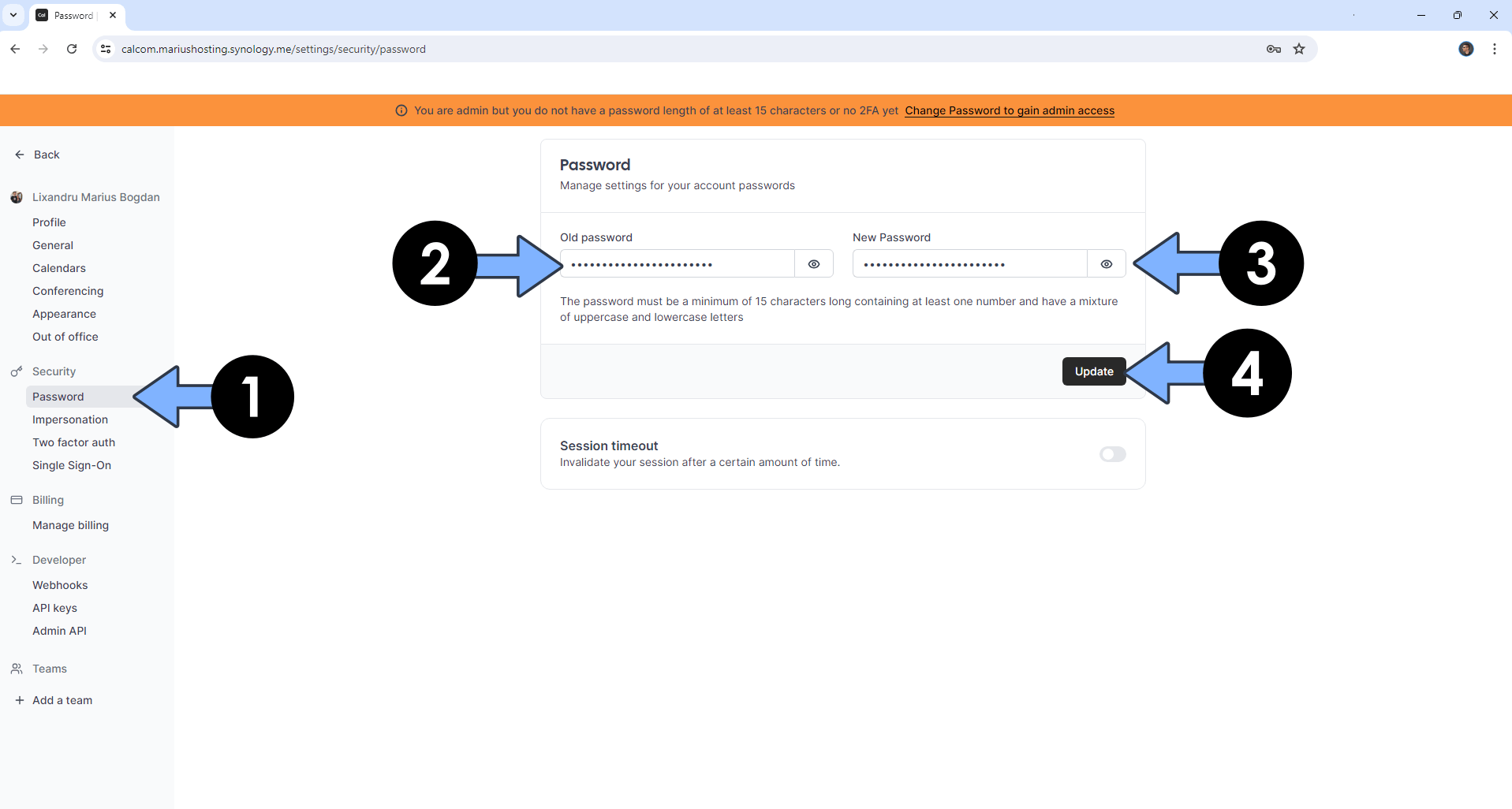
STEP 38
Log in to Calcom using your new password that you have previously created at STEP 37. Click Sign in. Follow the instructions in the image below.
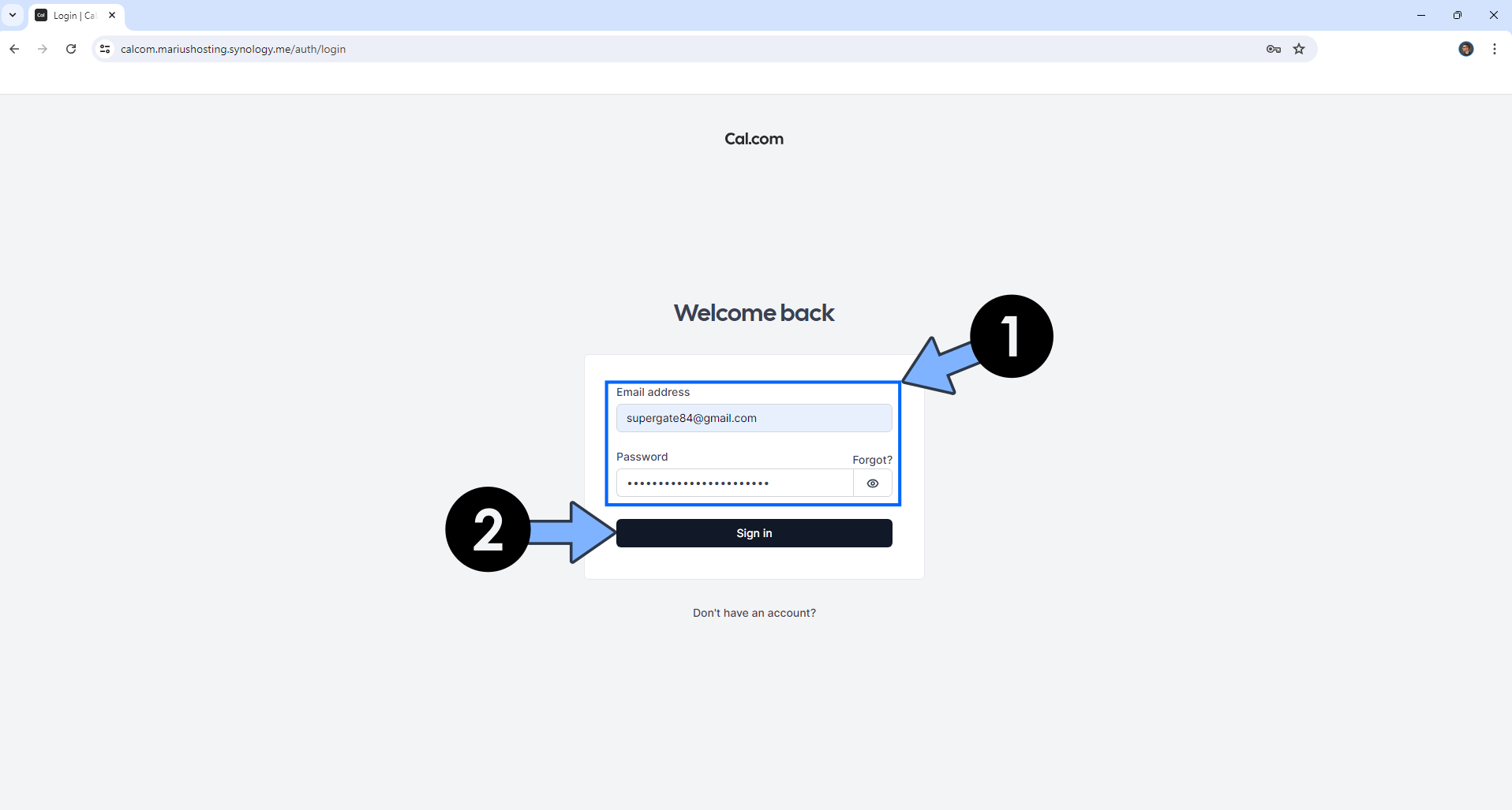
STEP 39
Open your Authenticator app, then type in your Two-Factor Code then click Submit. Follow the instructions in the image below.
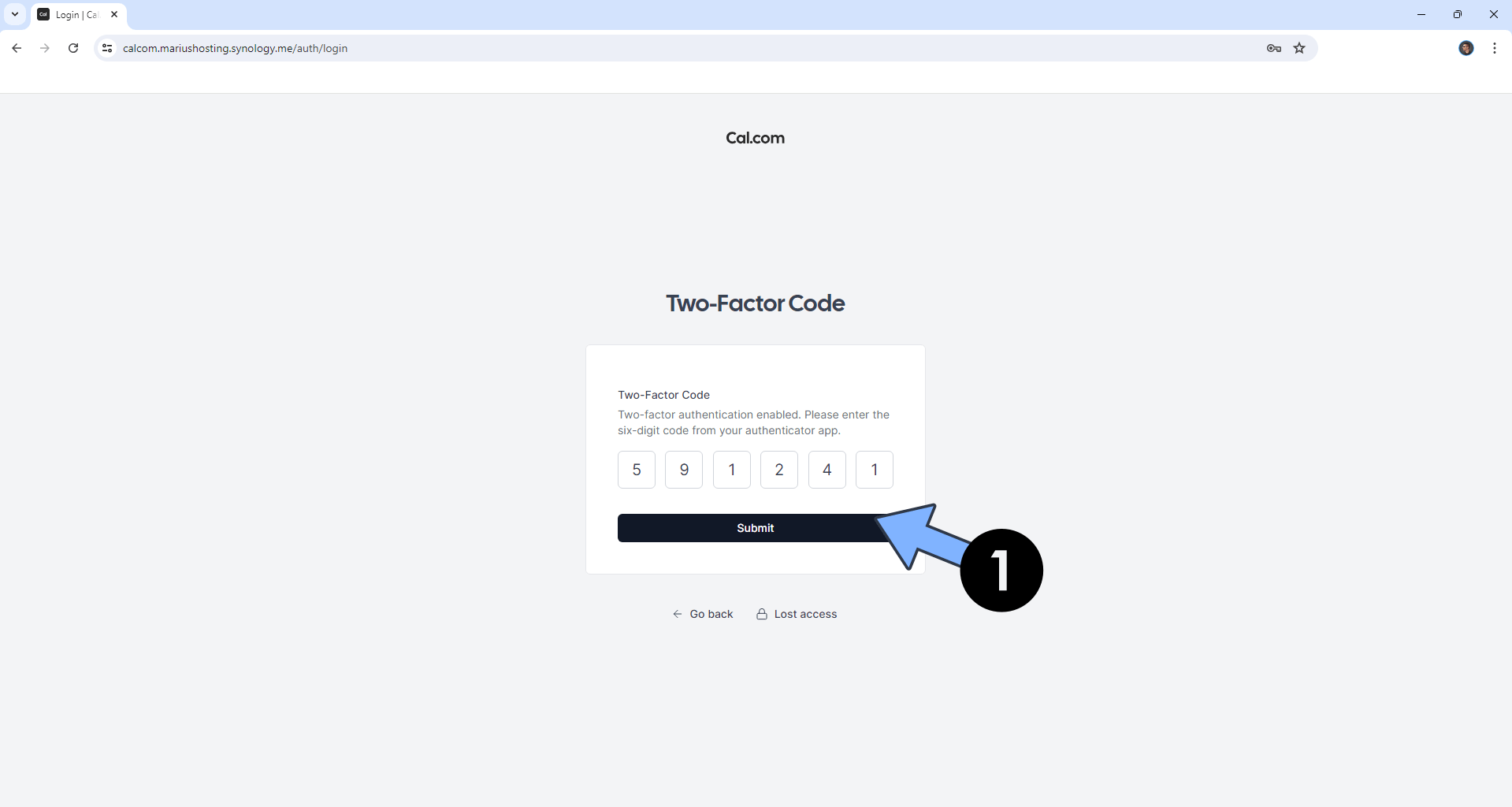
STEP 40
Your Calcom Dashboard at a glance!
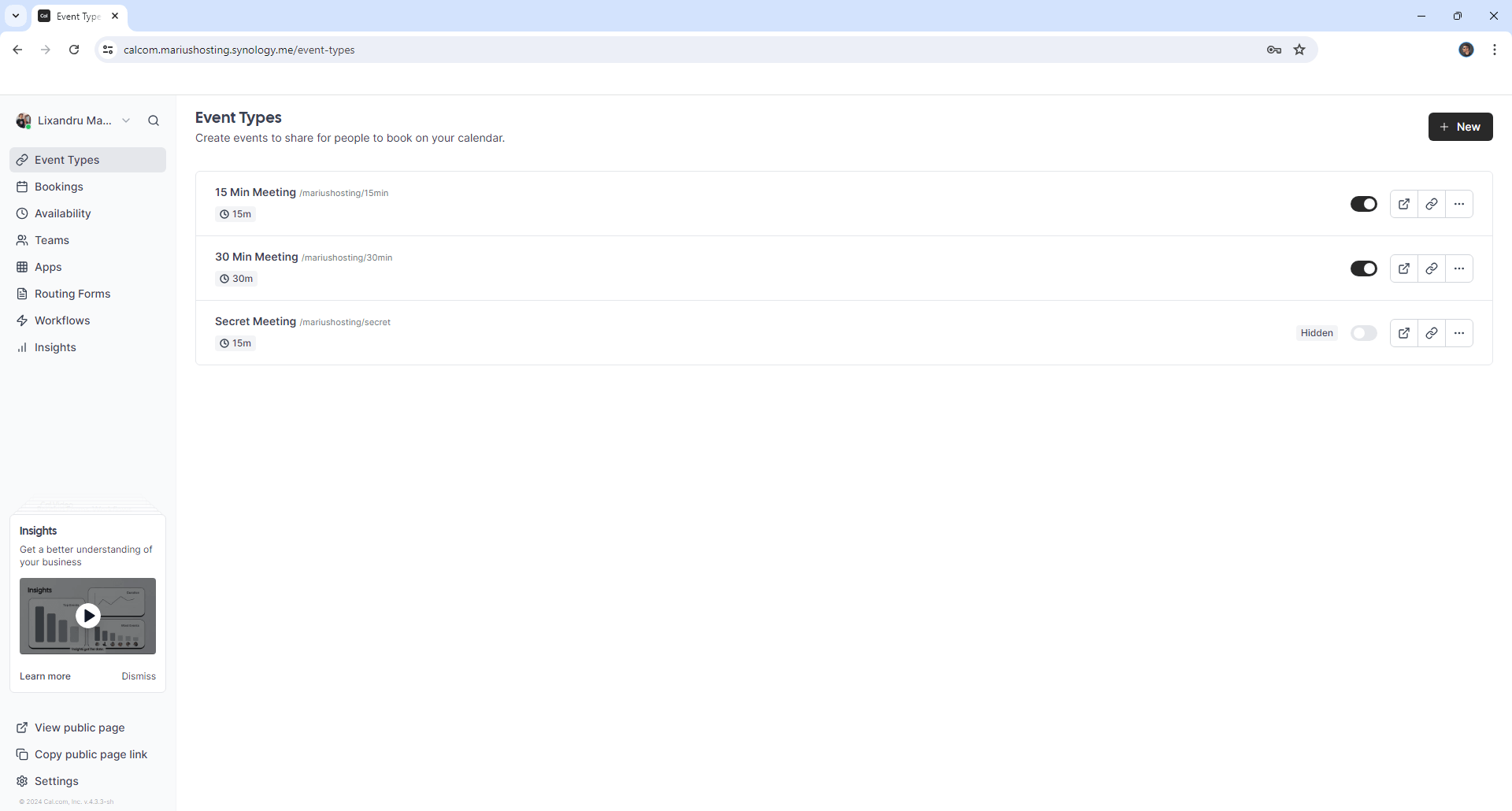
Enjoy Calcom!
If you encounter issues by using this container, make sure to check out the Common Docker issues article.
Note: Can I run Docker on my Synology NAS? See the supported models.
Note: How to Back Up Docker Containers on your Synology NAS.
Note: Find out how to update the Calcom container with the latest image.
Note: How to Free Disk Space on Your NAS if You Run Docker.
Note: How to Schedule Start & Stop For Docker Containers.
Note: How to Activate Email Notifications.
Note: How to Add Access Control Profile on Your NAS.
Note: How to Change Docker Containers Restart Policy.
Note: How to Use Docker Containers With VPN.
Note: Convert Docker Run Into Docker Compose.
Note: How to Clean Docker.
Note: How to Clean Docker Automatically.
Note: Best Practices When Using Docker and DDNS.
Note: Some Docker Containers Need WebSocket.
Note: Find out the Best NAS Models For Docker.
Note: Activate Gmail SMTP For Docker Containers.
This post was updated on Monday / February 16th, 2026 at 12:47 AM
